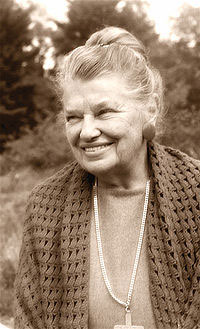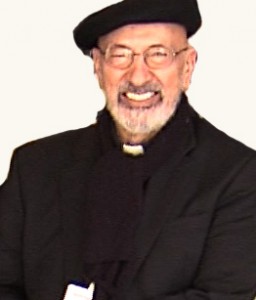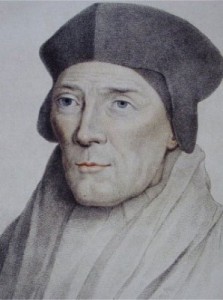[powerpress]
We discovered an incredible audio of a conference talk given in the late 70’s by the Baroness herself, Servant of God Catherine de Hueck Doherty.  She is  co-founder of the Madonna House Apostolate and one of our absolute favorite authors.  We dare you not to be moved by her words!
Reflection on Catherine’s talk by Omar Gutierrez:
Catherine de Hueck Doherty speaks with the kind of prophetic fire that one imagines would have poured from the mouth of Isaiah or out of the minds of the early Church fathers. Her spirit and message are as thoroughly Catholic as any you have ever heard. With the kind of salty swagger of a woman who knew what it was to live with the poorest of the poor, she understood intimately what it meant to live the social teaching of the Church. “Service without prayer,†she says, “is paternalism, social service work, something that the poor do not accept.†“In order to do what we must do, in order to be what we must be we have to pray.â€
As she loudly asks why it is that our cities do not applaud and cry at the manifest love for the poor that should be there but isn’t, and demands that we pray for the souls of the owners of multi-million dollar corporations, and points out the “stupid†behavior of Church governors she can at the same time turn around and insist that we all have the faith of a St. Perpetua in order to renew the ancient Church. She demands that we pray for our priests who are manifestations of God’s love for us. “We don’t need psychiatrists from our priests. We don’t need counselors from our priests. We need priests to take us by the hand and lead us to sanctity.â€
Doherty is a lioness, a spirit that could move mountains. We would all do well to listen to her advice and seek union with Christ in His Church and in obedience to the teachings therein. So, in Catherine’s words, “Get crackingâ€!
Tags: audio, Church, Hueck Doherty, love, Madonna House, obedience, priests
This entry was posted on Tuesday, December 31st, 2013 at 7:28 am
You can follow any responses to this entry through the RSS 2.0 feed.
“The Urgency of the New Evangelization: Answering the Call” is the latest from Dr. Ralph Martin STD which encourages us to share the 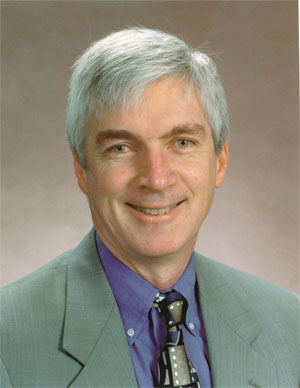 Good News with both non-believers and those who are no longer practicing their faith. Compelling and informative, this is an important work that aids all those who desire to the serve the Lord through the New Evangelization.
Good News with both non-believers and those who are no longer practicing their faith. Compelling and informative, this is an important work that aids all those who desire to the serve the Lord through the New Evangelization.
[powerpress]
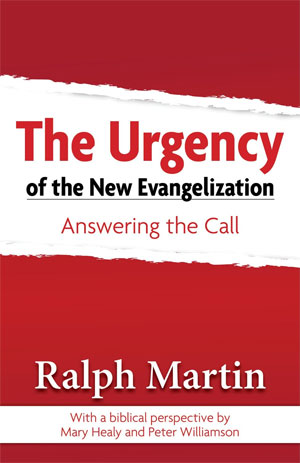 You can find the book here
You can find the book here
In The Urgency of the New Evangelization: Answering the Call, Ralph Martin explains:
- It’s not just a churchy buzzword
- It’s not just for priests and missionaries to carry out
- YOU and every individual Catholic play a role
- It is literally a matter of life or death for everyone in your life
- And… it’s not as hard as you think
Tags: death, osv, our sunday visitor, priests, ralph martin, work
This entry was posted on Sunday, November 24th, 2013 at 12:04 am
You can follow any responses to this entry through the RSS 2.0 feed.
Liturgy of the Hours
[powerpress]
 For centuries Catholic priests, monks and nuns sanctified their days by praying the Psalms. This practice was inherited from the Jews, who prayed at set times in the temple. The Western Church was largely influenced by the Benedictine monks, who immersed themselves in the Psalms seven times each day, in addition to Mass and private prayer.
For centuries Catholic priests, monks and nuns sanctified their days by praying the Psalms. This practice was inherited from the Jews, who prayed at set times in the temple. The Western Church was largely influenced by the Benedictine monks, who immersed themselves in the Psalms seven times each day, in addition to Mass and private prayer.
The Church today encourages the laity to pray a shorter form of this called the “Liturgy of the Hours.â€Â The two major parts of this are called morning prayer and evening prayer, and there are also readings for each day corresponding to the seasons of the Church’s liturgical calendar.
Praying the Liturgy of the Hours can be a powerful tool. It helps us acquire the discipline of regular prayer and fills our hearts and minds with Scripture as we go about our days. I once heard a priest say every single one of the priests he knew who had left the priesthood had stopped praying their daily office of prayer.
For more info talk to your priest or Catholic bookstore, and cover your household in spiritual protection each day with Mass, rosary, and the Liturgy of the Hours
Tags: divine office, Faith Check, hearts, liturgy of hours, prayer, priests
This entry was posted on Monday, November 11th, 2013 at 12:11 am
You can follow any responses to this entry through the RSS 2.0 feed.
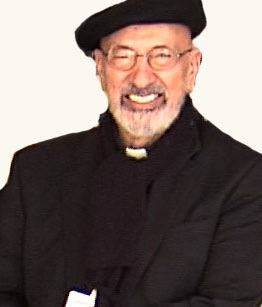 Show 49 ” Building a Kingdom of Love” –   To Have a Spirit of Gratitude and Faithfulness like Mary
Show 49 ” Building a Kingdom of Love” –   To Have a Spirit of Gratitude and Faithfulness like Mary
[powerpress]
Msgr. Esseff reflects on the teaching of the Sacred Scriptures and on the Immaculate Heart of Mary:
Reading  12 KGS 5:14-17
Naaman went down and plunged into the Jordan seven times
at the word of Elisha, the man of God.
His flesh became again like the flesh of a little child,
and he was clean of his leprosy.Naaman returned with his whole retinue to the man of God.
On his arrival he stood before Elisha and said,
“Now I know that there is no God in all the earth,
except in Israel.
Please accept a gift from your servant.”Elisha replied, “As the LORD lives whom I serve, I will not take it;”
and despite Naaman’s urging, he still refused.
Naaman said: “If you will not accept,
please let me, your servant, have two mule-loads of earth,
for I will no longer offer holocaust or sacrifice
to any other god except to the LORD.”Gospel  LK 17:11-19
As Jesus continued his journey to Jerusalem,
he traveled through Samaria and Galilee.
As he was entering a village, ten lepers met him.
They stood at a distance from him and raised their voices, saying,
“Jesus, Master! Have pity on us!”
And when he saw them, he said,
“Go show yourselves to the priests.”
As they were going they were cleansed.
And one of them, realizing he had been healed,
returned, glorifying God in a loud voice;
and he fell at the feet of Jesus and thanked him.
He was a Samaritan.
Jesus said in reply,
“Ten were cleansed, were they not?
Where are the other nine?
Has none but this foreigner returned to give thanks to God?”
Then he said to him, “Stand up and go;
your faith has saved you.”
Msgr. John A. Esseff is a Roman Catholic priest in the Diocese of Scranton. He was ordained on May 30th 1953, by the late Bishop William J. Hafey, D.D. at St. Peter’s Cathedral in Scranton, PA. Msgr. Esseff served a retreat director and confessor to Blessed Mother Teresa.   He continues to offer direction and retreats for the sisters of the missionaries of charity around the world. Msgr. Esseff encountered St.  Padre Pio,  who would become a spiritual father to him. He has lived in areas around the world,  serving  in the Pontifical missions, a Catholic organization established by Bl. Pope John Paul II to bring the Good News to the world especially to the poor. Msgr. Esseff assisted the founders of the Institute for Priestly Formation and continues to serve as a spiritual director for the Institute. He continues to  serve as a retreat leader and director to bishops, priests and sisters and seminarians and other religious leaders around the world. Â
To obtain a copy of Msgr. Esseff’s book byvisiting here
Be sure to visit Msgr. Esseff’s website “Building a Kingdom of  Love”
Tags: John Esseff, KGS, priests, retreat
This entry was posted on Sunday, October 13th, 2013 at 12:08 am
You can follow any responses to this entry through the RSS 2.0 feed.
[powerpress]
Msgr. Esseff reflects on the readings for the day and in particular the question asked by Jesus, “Who do you say that I am?” Do we witness to this Truth? Â What are the blocks in our hearts to authentically proclaiming Jesus to the world around us?
Gospel   LK 9:18-24
and the disciples were with him,
he asked them, “Who do the crowds say that I am?â€
They said in reply, “John the Baptist;
others, Elijah;
still others, ‘One of the ancient prophets has arisen.’â€
Then he said to them, “But who do you say that I am?â€
Peter said in reply, “The Christ of God.â€
He rebuked them
and directed them not to tell this to anyone.He said, “The Son of Man must suffer greatly
and be rejected by the elders, the chief priests, and the scribes,
and be killed and on the third day be raised.â€
Then he said to all,
“If anyone wishes to come after me, he must deny himself
and take up his cross daily and follow me.
For whoever wishes to save his life will lose it,
but whoever loses his life for my sake will save it.â€
Msgr. John A. Esseff is a Roman Catholic priest in the Diocese of Scranton. He was ordained on May 30th 1953, by the late Bishop William J. Hafey, D.D. at St. Peter’s Cathedral in Scranton, PA. Msgr. Esseff served a retreat director and confessor to Blessed Mother Teresa.   He continues to offer direction and retreats for the sisters of the missionaries of charity around the world. Msgr. Esseff encountered St.  Padre Pio,  who would become a spiritual father to him. He has lived in areas around the world,  serving  in the Pontifical missions, a Catholic organization established by Bl. Pope John Paul II to bring the Good News to the world especially to the poor. Msgr. Esseff assisted the founders of the Institute for Priestly Formation and continues to serve as a spiritual director for the Institute. He continues to  serve as a retreat leader and director to bishops, priests and sisters and seminarians and other religious leaders around the world.  Â

To obtain a copy of Msgr. Esseff’s book by visiting here
Be sure to visit Msgr. Esseff’s website “Building a Kingdom of  Love”
Tags: disciples, Good News, Jesus, John Esseff, priests, retreat
This entry was posted on Monday, June 24th, 2013 at 12:03 am
You can follow any responses to this entry through the RSS 2.0 feed.
St. John Fisher, 1460-1535
from the Catholic Information Network on St. John Fisher
John Fisher, born at Beverley, Yorkshire, was the son of a prosperous mercer who died in 1477. About 1482 the boy’s mother sent him to Cambridge University where he distinguished himself as a scholar. He was ordained in 1491 on the title of his Fellowship of Michaelhouse (now incorporated in Trinity College). After studying theology for ten years, he took his D.D. in 1501, and was later recognized as one of the leading theologians of Europe.
His university soon discovered his gifts as an administrator; he held in turn the offices of proctor, vice-chancellor and chancellor, and in 1514 he received the unique distinction of being elected chancellor for life. It was in the course of his university duties that, in 1494, he first met the Lady Margaret Beaufort, mother of Henry VII. He became her confessor and advised her on the charitable uses of her great wealth. It was at his suggestion that a preachership was endowed at Cambridge and Readerships in Divinity in both universities. He was largely responsible for her decision to refound and endow Godshouse as Christ’s College, and, after her death in 1509, he carried out her wishes in founding St. John’s College, to which he transferred lands given to him by the Lady Margaret.
He was made bishop of Rochester in 1504, and he ruled that poorest of sees for thirty years; he was a truly pastoral bishop, encouraging his priests by his manner of life and by his interest in their welfare. He was a noted and assiduous preacher, and he did all he could to provide well-instructed priests who could preach to the people.
It was due to his influence that Erasmus was brought to Cambridge as lecturer in Greek. He and Sir Thomas More became close friends of John Fisher, and there is a record of the three being together at Rochester in 1516. Sir Thomas More became High Steward of Cambridge University in 1525. He and John Fisher had been drawn closer together at this period by the call to combat the Lutheran heresy. The bishop wrote his Confutatio (1523) in Latin, a book for theologians by a theologian, which had a wide circulation on
the continent; the layman wrote his Dialogue Concerning Heresies (1528) in English for the common reader. It may be noted that in his sermons and writings against heretics, John Fisher never used the abusive language of contemporary controversy; he relied on reason and persuasion to bring back the prodigals.
The year 1527 was fateful to England, for it was then that Henry VIII took the first steps towards seeking the annulment of his marriage with Catherine of Aragon. She had married his elder brother Arthur in 1501; he died six months later. Catherine always maintained that the marriage had not been consummated. A papal dispensation allowed Henry VIII to marry his brother’s widow in 1509. The lack of a male heir turned his thoughts to the dissolution of his marriage; he argued that the papal dispensation had no validity. Cardinal Wosley was instructed to seek the opinion of John Fisher, whose prestige as a man of holy life and of great learning gave exceptional weight to his views. After studying the problem thoroughly he came to the conclusion that the papal dispensation was valid, and therefore that Henry and Catherine were man and wife in the eyes of the church. From that position he never moved in spite of the pressure brought to bear on him by king and cardinal. He was not content with passive opposition, but in the legatine court set up to try the issue, and from the pulpit, he defended the queen, although he knew that Henry regarded opposition to his will as a form of treason.
An attempt to implicate John Fisher in the fate of the Nun of Kent failed; she had prophesied against the king. A more certain weapon was provided by the Act of Succession of 1534. This declared the king’s marriage to Catherine void, and his subsequent marriage to Anne Boleyn to be lawful; the succession was settled on her children. All had to take an oath accepting the whole Act. When the oath was tendered to
John Fisher he refused to take it; so did Sir Thomas More. Both were prepared to accept the succession as determined by Parliament, but not that part of the Act which implied a denial of the pope’s authority, inasmuch as it declared the papal dispensation invalid.
On April 17th, 1534 Bishop John Fisher and Sir Thomas More were committed to the Tower. They were kept apart.
John Fisher was sixty-five years of age when he was imprisoned; he was suffering from a wasting sickness and was clearly nearing his end. Nothing shows the king’s vindictiveness more than his relentless persecution of this aged man stricken by a fatal illness. On May 20th, 1535, the pope created John Fisher Cardinal-priest of the title of St. Vitalis. This so infuriated the king that he hurried forward the proceedings against the new cardinal. (more…)
Tags: bishop, english reformation, John Fisher, martyr, martyrdom, martyrs of england, priests, protestant reformation
This entry was posted on Saturday, June 22nd, 2013 at 6:00 am
You can follow any responses to this entry through the RSS 2.0 feed.

